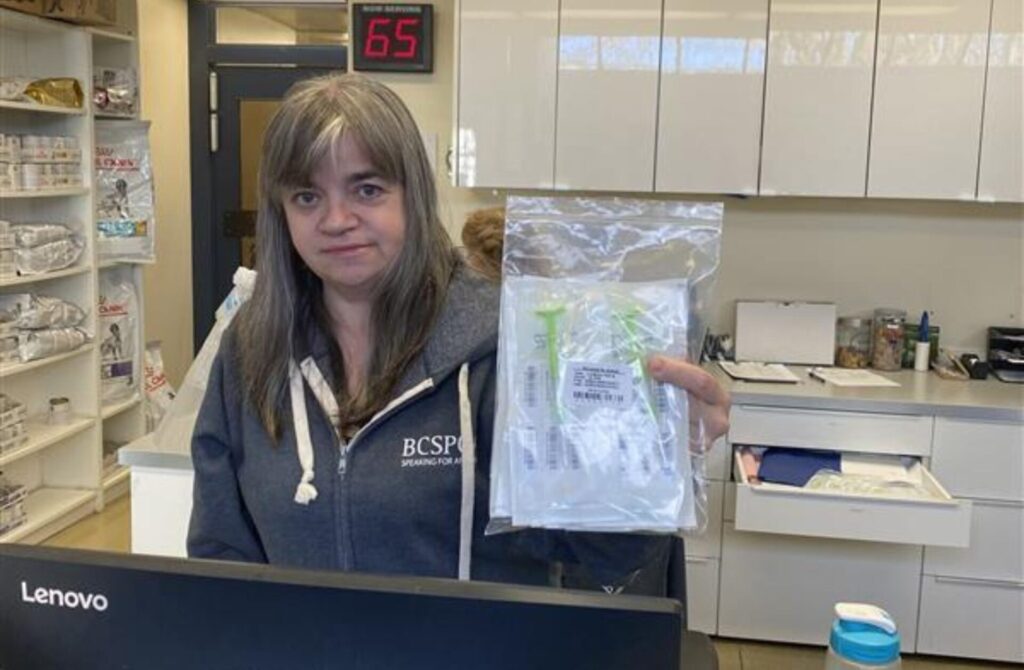Sandra was walking her one-year-old mix on designated off-leash trails in Qualicum Beach. Jozie is a sensitive guardian-breed mix, part Great Pyrenees, part Border Collie, and part Bernese. A tree suddenly crashed down. Startled, Jozie bolted from the far side of the trails.
On Sandra’s way back to the parking lot, a woman who knew Jozie arrived and said Jozie had jumped into her open car door, then leapt out again and ran toward the road. At Sandra’s van, muddy paw prints marked the passenger door handle, a small clue that Jozie had passed through. But Jozie was nowhere to be found.
Table of Contents
Missing Pet Search Begins... Street by Street
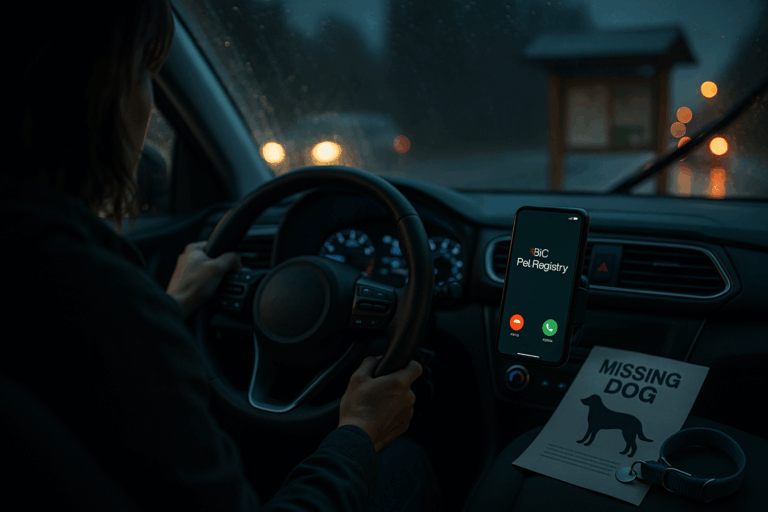
Sandra drove several blocks, scanning for movement, but could not see her dog. She returned to the trailhead to leave a note on the board. Her phone rang. A local veterinary clinic was calling
Why this matters: In those first minutes, clues can help, but they are not a guarantee. Identification that travels with your dog is what turns a sighting into a phone call.
Good Samaritans and a Call From the Vet
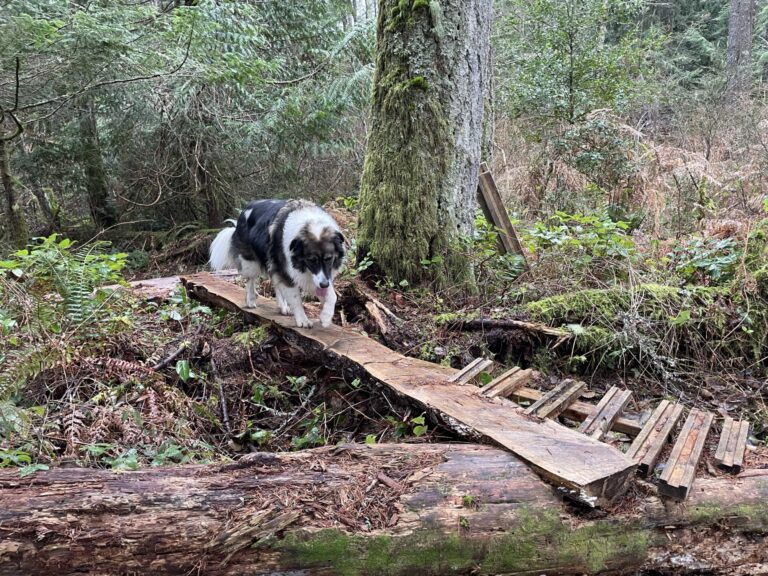
Jozie had made it to the town centre near the grocery store, approximately 2 km from the trail. Lawyers saw her running past their office, managed to catch her, and brought her to a veterinary clinic around the corner. Clinic staff scanned for identification and found a microchip. Because that number was linked to Sandra’s contact details, the clinic called immediately.
What makes this fast: vets and shelters can scan a chip and search a trusted registry. When your contact details are current, the call happens right away.
Proof Positive: Pet Reunion
The moment Sandra heard the news, relief took over. She had already cried during the search, and the stress had made her legs buckle while speaking with people on the trail. At the clinic, the scan and the phone number tied to Jozie’s microchip closed the gap quickly.
“Total relief,” Sandra said when asked what the reunion felt like.
Jozie’s Story Matters
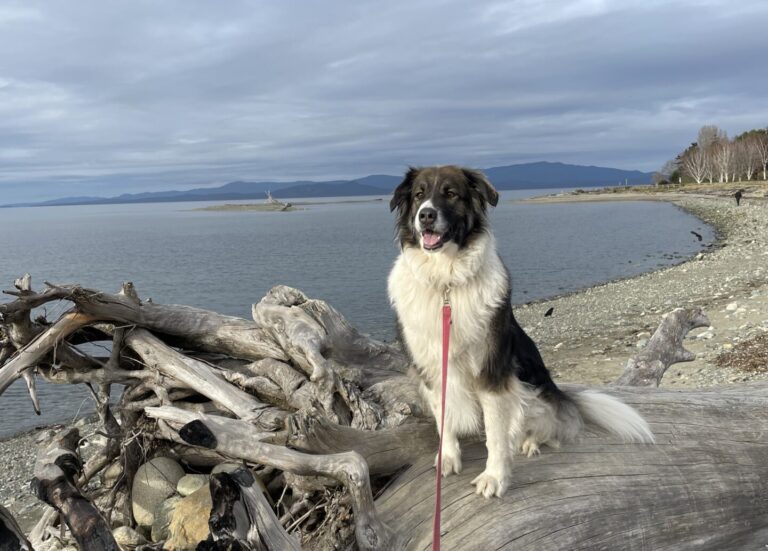
Lesson learned | Takeaway for guardians |
Startle events trigger flight, even on familiar trails | Loud, sudden events like a falling tree can send sensitive dogs running. Pause and leash after unusual disturbances. |
Visible clues help, but ID is faster | Paw prints and sightings help track movement, but a registered identifier lets clinics reach you right away. |
Registration makes identification actionable | A microchip holds a number. Registration links that number to you so vets and shelters can call quickly. |
Use a secure, accessible registry | Choose a robust, trustworthy database that protects your information and is accessible to veterinary clinics and shelters for reunification. Start here: How Pet Microchip Works and Register or Update. |
Tips and Reflections From Sandra

Sandra’s takeaways are straightforward and practical.
- Make sure they are chipped. Permanent identification gives finders and clinics a reliable way to contact you.
- Leash after a scare. Even dogs that usually cope well can bolt after sudden events. Guardian-breed mixes may be especially sensitive to sights and sounds.
- Remember the likely direction. Jozie was headed toward home. That detail can focus a search.
Do a quick readiness check today
- Log in and confirm your phone number, address, and a backup contact in BC Pet Registry.
- Add your veterinarian’s details so staff know who to call if they need care instructions.
- Save your pet’s microchip number in your phone so you can share it in seconds if needed.
Community Impact: Delta Community Animal Expo 2025
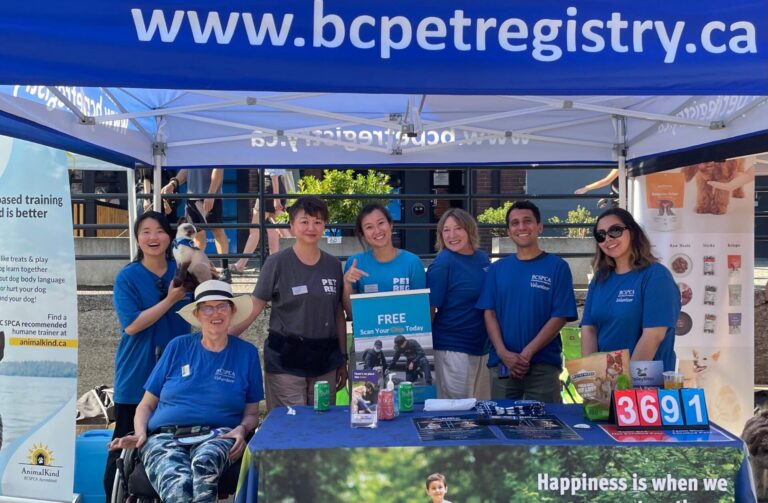
On August 20, 2025, the Delta Community Animal Expo returned to Ladner Memorial Park, hosted by the Delta Community Animal Shelter. BC Pet Registry volunteers concentrated on microchip scanning and checked 133 pets on site. Of those, 18 had unregistered microchips. The takeaway is simple. Even one unregistered chip is one too many when a reunion depends on a fast phone call. Read the recap: Delta Community Animal Expo 2025.
What this shows: Many families believe a chip alone is enough. Registration is the step that turns a number into a working lifeline.
Be a Part of the 80% Responsible Owners
During our recent events, we scanned hundreds of pets, all with microchips implanted. Only to discover that approximately 20% of the pets’ microchips are not linked to any registries in North America. We recommend all pet owners to double check their pet’s registration and directly registering with us. All you need is the microchip number and/or tattoo code to start the online registration process. For a small, one-time fee of $45, your pet will be protected for a lifetime and you will also have contributed to the life-saving work of the BC SPCA.
Conclusion
Jozie covered about two kilometres from an off-leash trail to the middle of town. Good Samaritans acted, a clinic scanned her, and a working microchip registration made the phone ring. That is the chain that brings pets home.
Take five minutes today to make sure that the chain is unbroken. Log in to BC Pet Registry, confirm your contact details, add a backup number, and list your veterinarian. Review How Pet Microchip Works so you know exactly how a scan becomes a reunion. A secure, accessible registry protects your information and makes it easier for vets and shelters to reach you quickly when every minute matters.
FAQ
Q: How do I check that my pet’s microchip is registered to me?
Sign in at BC Pet Registry and review your pets’ profile. If you cannot access your account, please reach out to our team by email at info@bcpetregistry.ca. Add a second phone number, an emergency contact, and a trusted backup contact so calls are rarely missed.
Q: What should I do first if my dog bolts after a startle event?
Secure other pets, return to the last seen point, and leave a clear note with your number. Walk or drive the immediate area slowly. Alert nearby businesses and check routes that lead toward home. Keep your phone volume on so you do not miss a call from a clinic or shelter. Ensure your pet registry reflects your most current contact information.
Q: Why is registration as important as the microchip itself?
A chip does not store your phone number. It stores an ID. Registration links that ID to your contact details in a secure database that veterinary teams and shelters can access for reunification.
Q: Can I add more than one contact to my pet’s profile?
Yes. Add a backup contact who can answer if you miss the first call. You can manage contacts in your BC Pet Registry profile. Unlike other registries, which charges for this service, the BC Pet Registry does not ask you to upgrade to a premium registration in order to do this simple task.
Q: Does a collar tag still matter if my pet has a microchip?
Yes. Tags help Good Samaritans call you directly. A microchip is the permanent backup if a collar slips off or a tag becomes unreadable.

